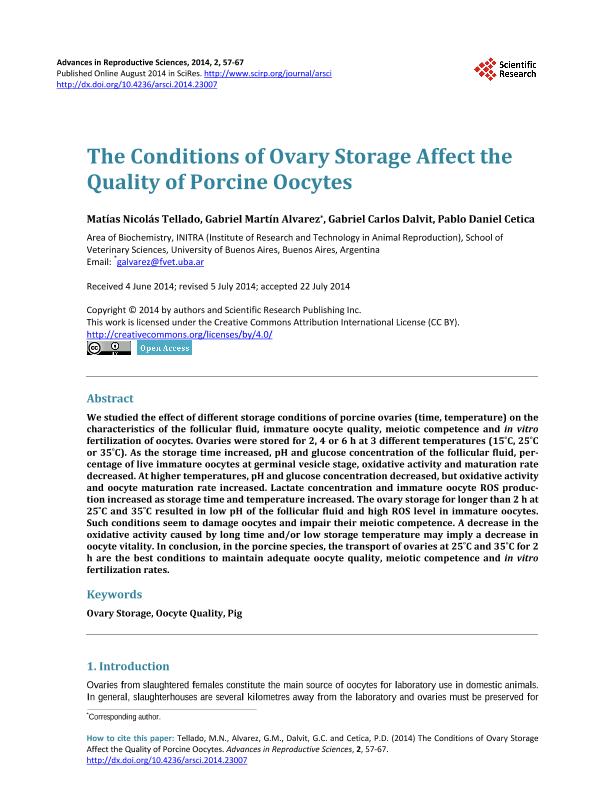Artículo
The Conditions of Ovary Storage Affect the Quality of Porcine Oocytes
Fecha de publicación:
08/2014
Editorial:
Scientific Research Publishing
Revista:
Advances in Reproductive Sciences
ISSN:
2330-0744
Idioma:
Inglés
Tipo de recurso:
Artículo publicado
Clasificación temática:
Resumen
We studied the effect of different storage conditions of porcine ovaries (time, temperature) on the characteristics of the follicular fluid, immature oocyte quality, meiotic competence and in vitro fertilization of oocytes. Ovaries were stored for 2, 4 or 6 h at 3 different temperatures (15˚C, 25˚C or 35˚C). As the storage time increased, pH and glucose concentration of the follicular fluid, percentage of live immature oocytes at germinal vesicle stage, oxidative activity and maturation rate decreased. At higher temperatures, pH and glucose concentration decreased, but oxidative activity and oocyte maturation rate increased. Lactate concentration and immature oocyte ROS production increased as storage time and temperature increased. The ovary storage for longer than 2 h at 25˚C and 35˚C resulted in low pH of the follicular fluid and high ROS level in immature oocytes. Such conditions seem to damage oocytes and impair their meiotic competence. A decrease in the oxidative activity caused by long time and/or low storage temperature may imply a decrease in oocyte vitality. In conclusion, in the porcine species, the transport of ovaries at 25˚C and 35˚C for 2 h are the best conditions to maintain adequate oocyte quality, meiotic competence and in vitro fertilization rates.
Palabras clave:
Ovary Storage
,
Oocyte Quality
,
Pig
Archivos asociados
Licencia
Identificadores
Colecciones
Articulos(INPA)
Articulos de UNIDAD EJECUTORA DE INVESTIGACIONES EN PRODUCCION ANIMAL
Articulos de UNIDAD EJECUTORA DE INVESTIGACIONES EN PRODUCCION ANIMAL
Citación
Tellado, Matías Nicolás; Alvarez, Gabriel Martín; Dalvit, Gabriel Carlos; Cetica, Pablo Daniel; The Conditions of Ovary Storage Affect the Quality of Porcine Oocytes; Scientific Research Publishing; Advances in Reproductive Sciences; 2; 3; 8-2014; 57-67; 48913
Compartir
Altmétricas




